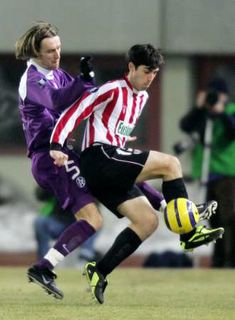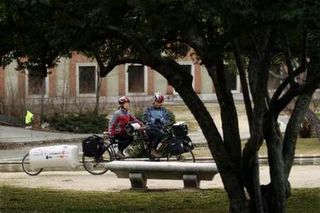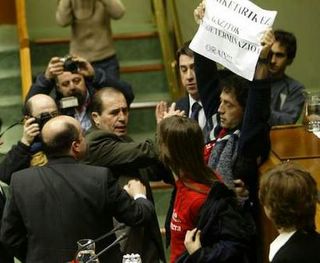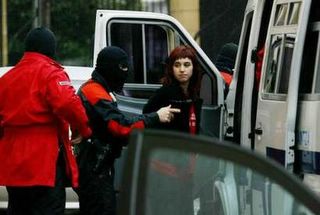What truth?
The only truth here is that self serving judge Baltasar Garzón is back on the saddle, trying to go for that Nobel Prize that he saw scurrying away after the Egunkaria blunder.
After decades of life in the lime light thanks to his clownish indictment against Augusto Pinochet and Osama bin Laden that had more than one weekend human rights "activist" fooled, Garzón decides to tackle the pesky issue of Francisco Franco's dictatorship crimes.
He called for a "Truth Comission".
Too little, too late.
The crimes have prescribed, as usual, Garzón's timing is conveniently off.
But the whole thing begs the question.
Are Fraga Iribarne, José María Aznar and all the other former Francoist and neo-Francoist ministers gonna be questioned for their refusal to condemn the Franco era's crimes?
Fat chance!
I was not going to write about this, the whole thing is a travesty to prop Garzón. But then I read this:
The only truth here is that self serving judge Baltasar Garzón is back on the saddle, trying to go for that Nobel Prize that he saw scurrying away after the Egunkaria blunder.
After decades of life in the lime light thanks to his clownish indictment against Augusto Pinochet and Osama bin Laden that had more than one weekend human rights "activist" fooled, Garzón decides to tackle the pesky issue of Francisco Franco's dictatorship crimes.
He called for a "Truth Comission".
Too little, too late.
The crimes have prescribed, as usual, Garzón's timing is conveniently off.
But the whole thing begs the question.
Are Fraga Iribarne, José María Aznar and all the other former Francoist and neo-Francoist ministers gonna be questioned for their refusal to condemn the Franco era's crimes?
Fat chance!
I was not going to write about this, the whole thing is a travesty to prop Garzón. But then I read this:
Garzon burst onto the scene in Spain shortly after becoming a High Court judge 17 years ago by investigating a secret, paramilitary unit known as GAL that killed 26 people and kidnapped several others in the 1980s to fight the outlawed Basque separatist group ETA.
ETA is reviled in Spain for killing more than 800 people since 1968 in pursuit of Basque independence, but Garzon was applauded for taking on the anti-ETA death squads, resulting in the conviction of a former interior minister and 11 other officials.
Unbeliavable!
The author of the article skips saying anything about all the crimes commited by Franco and his junta against the Basques, not even bothers mentioning the fact that Franco was a Hitler puppet and that his regime was shunned and considered illegal all the way till 1955 when the USA decided they needed a few crummy military bases in Spain.
But he manages to include the infamous "800 killed by ETA" line that is reserved for anything that has to do with a bit of news coming from the Basque Country, be it a political rally in Bilbo or a wine tasting in Baiona.
Well, is plain and simple, if the Allied Forces had delivered their promise of freeing the whole of Europe from Fascism, if the USA had not gone to bed with Franco over a few bases, if pressure had been applied against Franco for his murderous campaign in Euskal Herria, there would be no ETA today.
Add the crimes of ETA to Franco's legacy.
Garzón is making all this noise because he knows the crimes have prescribed, but it doesn't matter, idiots around the world will think he really stands for human rights and justice, and after all, that is all he wants.
The complete article is at Yahoo News.
You can also read it here.
The author of the article skips saying anything about all the crimes commited by Franco and his junta against the Basques, not even bothers mentioning the fact that Franco was a Hitler puppet and that his regime was shunned and considered illegal all the way till 1955 when the USA decided they needed a few crummy military bases in Spain.
But he manages to include the infamous "800 killed by ETA" line that is reserved for anything that has to do with a bit of news coming from the Basque Country, be it a political rally in Bilbo or a wine tasting in Baiona.
Well, is plain and simple, if the Allied Forces had delivered their promise of freeing the whole of Europe from Fascism, if the USA had not gone to bed with Franco over a few bases, if pressure had been applied against Franco for his murderous campaign in Euskal Herria, there would be no ETA today.
Add the crimes of ETA to Franco's legacy.
Garzón is making all this noise because he knows the crimes have prescribed, but it doesn't matter, idiots around the world will think he really stands for human rights and justice, and after all, that is all he wants.
The complete article is at Yahoo News.
You can also read it here.
.... ... .




















